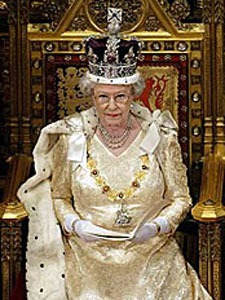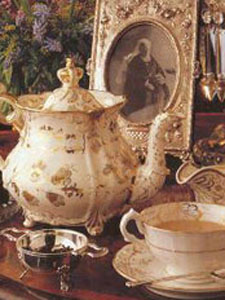Reviewing English Tea Culture



When most people think of the English, certain qualities come to mind: Irrevocably bad teeth, a Monarchy that holds office merely for the sake of Comedy - and a painstaking penchant for the perfect cup of tea. However, through several excursions to the UK, I have discovered that one of these presuppositions has proven false.
One of my great expectations on my initial expedition to the Queen's Country was to finally enjoy that "superior cup of tea" that my British buddies always boast about. On my second day, I was able to visit one of the better known tea shops (whose anonymity I will honor), in the hopes that this visit would revolutionize my view of good tea. Since brevity is the soul of wit, I will be brief: I was disappointed. Due to the fact the tea was unreasonably strong, I was seemingly coerced to (gasp!) dilute with milk. It also appeared that I wasn't receiving the freshest tea available, possibly due to my "Yank" accent. In fact, I noted that the quality, in general, was lacking.
Undeterred by what I theorized must've been a fluke experience, I pushed forward. From tearooms to cafes to restaurants I searched, seeking that Holy Grail of tea that I was assured. All with the similar results: lackluster to simply bad tea. I was shocked. How could England of all places, the Empire of Tea's Cultural Center in the West, serve such bad tea?
After studying the history of Tea and England, a new perception began to unfold, an awareness that explained the inadequacy of the English tea industry. British history provides many reasons for the Camellia's corruption. Here are just a few examples:
Thou shalt not... Due to the fact that the demand for tea was so high in the 19th century, the price of tea was astronomical. Because tea was sold by weight, English importers realized that the more the tea weighed, the more money they would receive for what was already a highly profitable product. Therefore, they would contaminate the tea is many ways, from including already infused and re-dried tea leaves, to other plants' leaves, to sawdust, to iron filings. These corruptions brought so many problems, both to England's health and economy, that laws were created to prohibit the adulteration of tea. Even reaching as far as America, England's adulterated tea caused the US government to pass the Tea Importation Act of 1897. This bill was the primary impetus towards the creation of the US Food and Drug Administration (FDA).
Tea Is Put Second Thanks to England's tea industry, waiters and waitresses worldwide work only as hard as they think they'll be tipped (previously employed as a server, I'm allowed to say this). Tipping as a response to prompt service was born in the tea gardens of England. A small wooden box was placed on each table in the garden. The box was inscribed "To Insure Prompt Service" (or TIPS for short). A coin dropped in the box usually assured that the tea would arrive at the table before getting cold. Thus, the custom of tipping was born.
Cruel Brittania Before 1840, China was almost completely closed to England in terms of trading. This made things quite difficult, as one could imagine, to import the main ingredient for England's most popular hot beverage at that time. The cost for the relatively minute amount of tea leaves that did make it out of the country was exorbitant. This was further complicated by the fact that British importers, after spending fortunes, still had to go half-way around the world to get it back to their homeland. So England devised a plan: set up plantations in India (which at the time was under the Queen's reign) not only of tea, but of another, much more dangerous product: the poppy plant. While its seeds serve as a personal favorite topping for bagels, the poppy plant can also produce the highly addictive narcotic Opium (not personally recommended on bagels). The English smuggled vast amounts of opium into China, virtually lulling an entire nation into an addicted submission. Through this, England was able to open the border for their importation of tea, only at the cost of approximately 13 million Chinese addicts.
For all the tea in England After extensive exploration, I was unable to find a single tea plantation within the whole United Kingdom. In fact, UK's climate and geography is quite unaccommodating to the cultivation and production of the tea plant. This is why it has always puzzled me to hear, "I only buy British tea" or "the English make the best tea in the world." This baffling notion still afflicts many tea lovers around the world, stuck with the notion that in order to have a Victorian ambiance, one must have the Queen's tea. Of course, the freshest, most genuine tea will come directly from the source: the estates where they are grown. Hopefully, no Brits were hurt in the writing or reading of this article While more shortfalls exist for England's tea industry, I would also like to point out that England also contributed many positive aspects to the world of tea. Britain was Great in that it was and continues to be the primary voice of tea to the West, spreading the good word throughout most a world to which it was previously unknown. Therefore, it is through their persistent message and passion towards tea - rather than their refined tastes (one English meal will dissuade one to believe in the quality of the British tastebud) - for which we should extol. After all, if it wasn't for England's influence, we never would have been able to look for a better tea.
What I propose is nothing short of rebellion - A new American Revolution against the stereotypes that we have been conditioned to believe about English tea. Instead of purchasing a tea strictly for the name or for the ambiance that it portrays, instead buy for quality, freshness and authenticity. Through this action, everyone wins. If the demand for better tea is raised, then everyone in industry must adapt, migrate or perish. The results will yield improved tea for all. As the English would put it, "Cheers!"
